|
I was very fortunate to have the opportunity of talking with Peter Jennings,
ABC's World News Tonight's anchor and senior editor. My web master, Mark
Schramm, has hosted my web site for over a half dozen years. When he isn't
working on my material or his other clients, he is employed at US Steel, Gary
works. Mark knows that I want to further my writing career through highlighting
my work on my web site. In addition to many of the articles that I have written
over ten years as a freelance columnist for the Dixon Telegraph, my site
features interviews that I have done with many people and a handful of animals-I
would resort to talking with animals when I couldn't get a human to talk with
me.
I spoke with Peter Jennings, because ABC had asked some US Steel employees to
meet with him for a town hall meeting to discuss the demise of Gary, IN where US
Steel has been located for nearly a century. Mark was one of those invited to
attend. Since he is a good friend and wants to see me succeed in a writing
career, he suggested that I should come to the meeting and interview Peter
Jennings. I jumped at the opportunity but doubted that I would be able to walk
up to him and say, "My name is Al Campbell, and I write for the Dixon
Telegraph and want to interview you for my paper and web site. Can I ask
you a couple of questions?" why would he be bothered? However, my head
instantly began to spin with possible questions if I were to get the opportunity
of an interview of a lifetime.
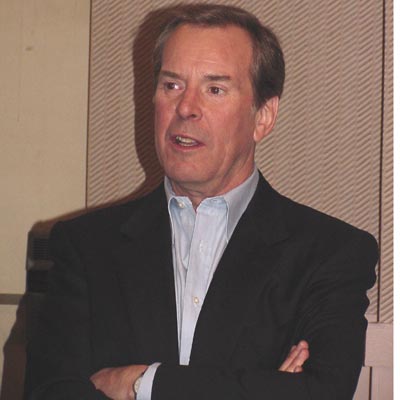 Peter Jennings' wife had read an article about Gary, a city with many
problems, hosting the Miss USA Pageant. She suggested to Peter that Gary might
be an interesting story to do. Therefore, he came to Northwest Indiana to
research the story that will air in September. The special will explore why
Gary has fallen on such bad times over the past generation or two. Gary had
been known as a happening city but has a reputation as an urban has been.
During the Pageant's several days of festivities, Peter and ABC were busy
interviewing hosts of people about what had happened to Gary and why. This
meeting with US Steel employees was one of many such interviews.
Peter Jennings' wife had read an article about Gary, a city with many
problems, hosting the Miss USA Pageant. She suggested to Peter that Gary might
be an interesting story to do. Therefore, he came to Northwest Indiana to
research the story that will air in September. The special will explore why
Gary has fallen on such bad times over the past generation or two. Gary had
been known as a happening city but has a reputation as an urban has been.
During the Pageant's several days of festivities, Peter and ABC were busy
interviewing hosts of people about what had happened to Gary and why. This
meeting with US Steel employees was one of many such interviews.
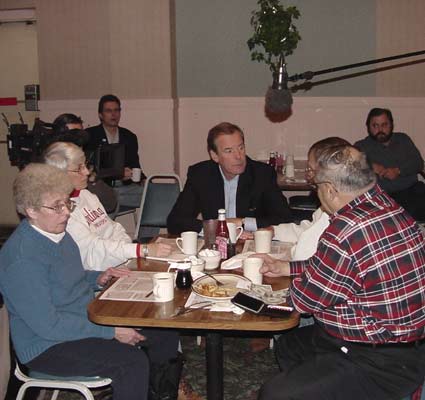 Braving a snowstorm to get to Bronko's Restaurant in Crown Point where the
town hall meeting was to take place, I arrived safely after enduring icy
roads and a blowing snowstorm off Lake Michigan. After breakfast, the sound and
video people arrived, and it wasn't long before Peter Jennings walked in without
fanfare. He is tall, thin, and doesn't look sixty-four. He introduced himself,
which was a little redundant. He told the group about the project on which he
was working, and just sat down at one of the tables and started to ask
questions. The entire two-hour interview was conducted without a note.
Braving a snowstorm to get to Bronko's Restaurant in Crown Point where the
town hall meeting was to take place, I arrived safely after enduring icy
roads and a blowing snowstorm off Lake Michigan. After breakfast, the sound and
video people arrived, and it wasn't long before Peter Jennings walked in without
fanfare. He is tall, thin, and doesn't look sixty-four. He introduced himself,
which was a little redundant. He told the group about the project on which he
was working, and just sat down at one of the tables and started to ask
questions. The entire two-hour interview was conducted without a note.
As
one who does interviews, I was impressed by Peter's disarming style and how
readily people opened up to him; it was a real lesson for me. Part of his
ability to get people to respond readily to him can be attributed to the fact
that all of us knew him well from TV, but there was something more about his
personality that allowed for near instant intimacy. In addition, his mastery of
knowledge about Gary was phenomenal. He had more facts and figures about Gary
than any one in the group. He knew material about Gary that no one else did.
He was prepared for the interview.
The other thing that impressed me was his nonjudgmental attitude. The group was
all white, and when the group was asked to account for the problems of Gary,
blacks were clearly the ones to blame. Some blamed black leadership and others
blamed black gangs. However, the primary problem with Gary was a racial issue.
For some, other issues played a secondary factor, but the primary reason for the
bad times of Gary had to do with the blacks.
 I was getting antsy with a rather one-sided worldview of the problems with Gary
that this group had. No one single issue put Gary in the metropolitan ICU
ward. Certainly, a minority group wasn't responsible for all the troubles of
the city. Since I wasn't an employee of US Steel, I decided that I should keep
my thoughts to myself. However, the discussion was so skewed that I finally
decided to add to the discussion indirectly. I had interviewed the present
mayor, Scott King, and knew that he would have shed more light to this issue
than the assembled whites. So, I attempt to open the discussion by asking Peter
about whether he had interviewed King. I had interviewed King last year and
knew that he had a different spin on the problems of Gary. He also has a vision
and hope of turning things around.
I was getting antsy with a rather one-sided worldview of the problems with Gary
that this group had. No one single issue put Gary in the metropolitan ICU
ward. Certainly, a minority group wasn't responsible for all the troubles of
the city. Since I wasn't an employee of US Steel, I decided that I should keep
my thoughts to myself. However, the discussion was so skewed that I finally
decided to add to the discussion indirectly. I had interviewed the present
mayor, Scott King, and knew that he would have shed more light to this issue
than the assembled whites. So, I attempt to open the discussion by asking Peter
about whether he had interviewed King. I had interviewed King last year and
knew that he had a different spin on the problems of Gary. He also has a vision
and hope of turning things around.
The
group discussed various cures for the woes of Gary. They ranged from casinos,
pageants, and expanding the airport to help O'Hare's overcrowding.
In addition, King is white and his wife is black. He therefore has an entrée into
both the black and white communities. I continued:
Al: I'm an
outsider in this group and don't share most of their opinions. I think that
many people are victims of a lot of things that have happened in Gary that
haven't been good. Many of these people have had to move out of Gary. Many
have lost money, etc. However, they are also victims of and the byproduct of
white racism. We are paying for past generations of racism in Gary. Until we
resolve the issue of racism in America, cities like Gary will continue to have
problems. Gary's not unique. Name any other rustbelt metropolitan area in the
United States and you will find the same thing. Therefore, we need somehow to
resolve the issues separating whites and blacks. A little bit ago, we were
talking about Greeks and how they faced discrimination, but nobody is
threatening Greeks to day. Why is that? Each ethnic group that came to America
has been assimilated. All those tides of white ethnic groups that came from
Europe had trouble once they got here. They all assimilated fairly
quickly, one or two generations. The only difference between that and the black
immigrants, who came as slaves, is the color of skin. It is very, very
difficult to change racism in America because it is primarily a
black/white issue.
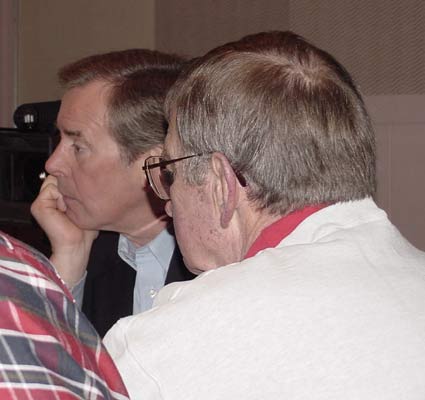 Peter: I have one more question for you. I'm
clear not what you are trying to say, but what are you
saying in terms of how Gary has changed. Do you feel that racism is hugely
significant?
Peter: I have one more question for you. I'm
clear not what you are trying to say, but what are you
saying in terms of how Gary has changed. Do you feel that racism is hugely
significant?
Al: I think
that it is the central issue. What is interesting is, that whites don't see
it. Your question about the black political convention is an example; hardly
anyone recalls it taking place. A major black event occurs and most whites
don't hear about it. We are a bifurcated country. Until we resolve that issue,
we are going to reap the whirlwinds of previous problems of racism. The sins
of our fathers and grandfathers have been visited upon us, and until we resolve
that issue, we will pay dearly.
Peter: And ironically, here we are at the
beginning of the 21st century and some people think we are still
living with the attitudes of the founding fathers of the country.
Al: Jefferson....
Peter: Jefferson and Washington. Do you
believe that?
Al: I teach
sociology and philosophy classes. That is the central issue. We developed as a
racially segregated country, and it has just been in the last thirty some years
that that tide has changed. We are just paying the price for the past.
Peter: Do you believe that Gary was in
trouble and change was inevitable?
Al:
Absolutely. It is a paradigm of what is happening with the steel mills. I
wrote an article years ago about how labor and management are all on the same
boat but they don't act on that fact. When a leak occurs one says, "I don't
care; it's at your end of the boat. I don't have to worry about it." It is the
same thing racially. What happens in this society as far as the steel mills are
concerned is the same thing that is happening racially in Gary. The
resurrection of the steel mills and the resurrection of Gary are going to be
when both groups, be it labor or management, blacks or whites get together and
resolve their issues.
Lady: Isn't it true? What the media writes, we believe. When I read a newspaper,
what's the first thing I read. A black man killed a white man. Now if the
newspapers would knock it off, maybe we wouldn't have this problem.
 Al: I don't
think we are going to resolve it. As Peter said, "Racism was one of the
founding tenants of America." Until we resolve that, we are going to have
problems.
Al: I don't
think we are going to resolve it. As Peter said, "Racism was one of the
founding tenants of America." Until we resolve that, we are going to have
problems.
Man: Do you
think it will ever be resolved?
Al: In a couple of generations.
Peter: The gentleman makes a point that
racism is a indelible part of Gary, is that correct?
Al: I don't
think it is just Gary. It's America.
Peter: I agree with you that it is a national
problem, but do you think it is an unspoken Gary issue?
Woman: I think
it is really outspoken.
Man: They have
a black Miss America Pageant. Why don't we have a white, red, or tan Miss
America contest? Why a Miss Black America?
Al: It goes
back to the whole question of racism. If you have a race that has been
disenfranchised and feels powerless, the way you give people power is to give
them an identity. The bellwether for whether America has become a truly
integrated country will be when we get away from prefaces like African-American,
or Italian-American.
Man: Why a
Miss Black America?
 Peter: That is a wonderful question, I don't
mean to diminish it at all, but I think you also know
the answer why Mayor Hatcher decided that a
Miss Black America pageant was important for his community.
Peter: That is a wonderful question, I don't
mean to diminish it at all, but I think you also know
the answer why Mayor Hatcher decided that a
Miss Black America pageant was important for his community.
Man: The first
Miss Black Pageant here in Gary was sponsored by US Steel. Do you think that
change between the races will ever occur?
Al: Yes, but
it will take time. It is apparent that we have a ways to go. However, we have
changed over the years. In the middle of the 19th century, we had
slaves. Slavery isn't an issue today.
 This town hall meeting lasted two hours. After editing, it will be included in a
special scheduled for early September of this year. As the camera and sound
systems were turned off, I had my opportunity, and I jumped at interviewing
Peter Jennings.
This town hall meeting lasted two hours. After editing, it will be included in a
special scheduled for early September of this year. As the camera and sound
systems were turned off, I had my opportunity, and I jumped at interviewing
Peter Jennings.
Al: Now that you have asked us questions, I
would like to turn the tables and ask you some questions. I do a column for a
newspaper in Illinois and have interviews on my web site. I would like to ask
you a couple questions about your reminisces of 9/11 and President Bush's absence
for the first hours after the tragedy in New York and Washington. The two
people that I thought rallied the nation were you and Giuliani. Both of you
seemed to stabilize America in those early and chaotic hours.
 Peter: Well, thank you. That is kind of you to say.
Peter: Well, thank you. That is kind of you to say.
Al: No, I mean that. You provided calm in a
moment of crisis. I would like you to comment about
your thoughts about Bush's absence during much
of that day.
Peter: It was
an extraordinary day. I felt very strongly like a lot of people that in a
moment of crisis we gather around the TV. I just acknowledge that TV is the
modern equivalent of gathering around the campfire. But I didn't think a lot
about it until many hours later in part, because we were so focused. I have
hardly seen any of our coverage, but the other night, I saw a tiny bit when the
first tower fell down. I realized that I was talking and didn't stop talking
when this began to happen. We decided at ABC not to rerun it and rerun it.
The president
heard about it in Florida then he went to Louisiana and then he went to
Nebraska. We were covering it as a running story: "where is the president
going?"
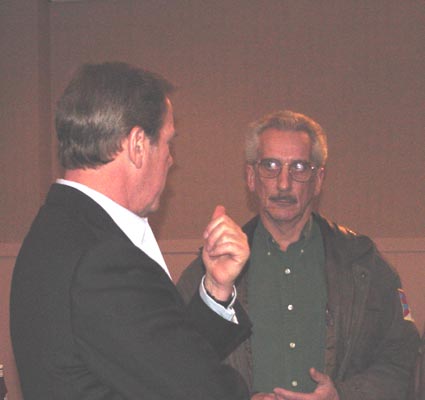 Al:
We just never saw his face.... Al:
We just never saw his face....
Peter: No, and
that was very interesting; we have a correspondent with the president. Ann
Compton was on Air Force 1. So, she would check in with me. So, we sort of
knew what was happening. I didn't raise it as a question but I just made the
point that at a moment like this America looks to the president for leadership.
And I said, "Some presidents do it well and some don't." Then my erstwhile
friend, Rush Limbaugh, did one of his famous commentaries in which he said that
I had accused him (the President) of hiding behind the Secret Service. Well,
before we got Rush to correct that, three days later, we got thousands and
thousands of calls accusing me of questioning the President.
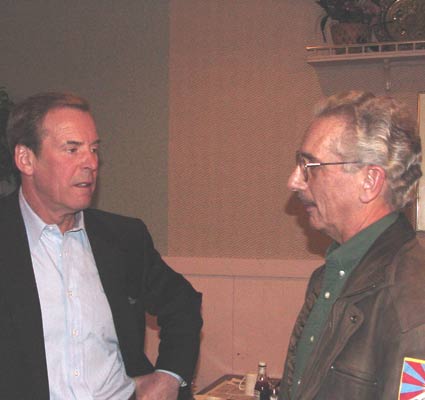 Al: Even if they may not have heard the telecast, but had heard it
from Rush. Therefore, it was true.
Al: Even if they may not have heard the telecast, but had heard it
from Rush. Therefore, it was true.
Peter: But I
did say at the time that it was important for the President to pick up the reins
of leadership-who else was going to?
Al: At the time, only Giuliani was there
visibly taking charge.
Peter: I thought that Giuliani was spectacular. Spectacular. But, I also thought that
in the early days that the President was too. A lot of people in Gore's own campaign
think that he would not have done as well as the President.
I wanted to ask
some questions about the state of journalism today relating to the war, the
jazzing up of broadcast journalism, and the possible dropping of Nightline.
Perhaps, I will have to wait until a newspaper or TV station sends me to follow
up on one of the most interesting persons that I have interviewed.
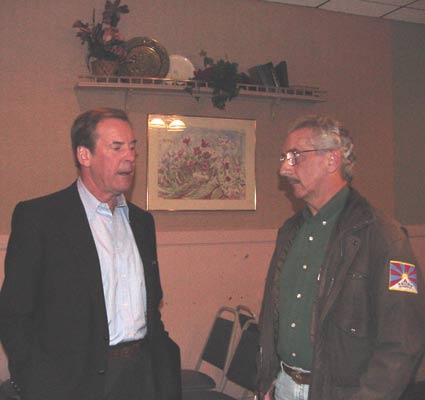

3/02
|







 Peter Jennings' wife had read an article about Gary, a city with many
problems, hosting the Miss USA Pageant. She suggested to Peter that Gary might
be an interesting story to do. Therefore, he came to Northwest Indiana to
research the story that will air in September. The special will explore why
Gary has fallen on such bad times over the past generation or two. Gary had
been known as a happening city but has a reputation as an urban has been.
During the Pageant's several days of festivities, Peter and ABC were busy
interviewing hosts of people about what had happened to Gary and why. This
meeting with US Steel employees was one of many such interviews.
Peter Jennings' wife had read an article about Gary, a city with many
problems, hosting the Miss USA Pageant. She suggested to Peter that Gary might
be an interesting story to do. Therefore, he came to Northwest Indiana to
research the story that will air in September. The special will explore why
Gary has fallen on such bad times over the past generation or two. Gary had
been known as a happening city but has a reputation as an urban has been.
During the Pageant's several days of festivities, Peter and ABC were busy
interviewing hosts of people about what had happened to Gary and why. This
meeting with US Steel employees was one of many such interviews. Braving a snowstorm to get to Bronko's Restaurant in Crown Point where the
town hall meeting was to take place, I arrived safely after enduring icy
roads and a blowing snowstorm off Lake Michigan. After breakfast, the sound and
video people arrived, and it wasn't long before Peter Jennings walked in without
fanfare. He is tall, thin, and doesn't look sixty-four. He introduced himself,
which was a little redundant. He told the group about the project on which he
was working, and just sat down at one of the tables and started to ask
questions. The entire two-hour interview was conducted without a note.
Braving a snowstorm to get to Bronko's Restaurant in Crown Point where the
town hall meeting was to take place, I arrived safely after enduring icy
roads and a blowing snowstorm off Lake Michigan. After breakfast, the sound and
video people arrived, and it wasn't long before Peter Jennings walked in without
fanfare. He is tall, thin, and doesn't look sixty-four. He introduced himself,
which was a little redundant. He told the group about the project on which he
was working, and just sat down at one of the tables and started to ask
questions. The entire two-hour interview was conducted without a note.  I was getting antsy with a rather one-sided worldview of the problems with Gary
that this group had. No one single issue put Gary in the metropolitan ICU
ward. Certainly, a minority group wasn't responsible for all the troubles of
the city. Since I wasn't an employee of US Steel, I decided that I should keep
my thoughts to myself. However, the discussion was so skewed that I finally
decided to add to the discussion indirectly. I had interviewed the present
mayor, Scott King, and knew that he would have shed more light to this issue
than the assembled whites. So, I attempt to open the discussion by asking Peter
about whether he had interviewed King. I had interviewed King last year and
knew that he had a different spin on the problems of Gary. He also has a vision
and hope of turning things around.
I was getting antsy with a rather one-sided worldview of the problems with Gary
that this group had. No one single issue put Gary in the metropolitan ICU
ward. Certainly, a minority group wasn't responsible for all the troubles of
the city. Since I wasn't an employee of US Steel, I decided that I should keep
my thoughts to myself. However, the discussion was so skewed that I finally
decided to add to the discussion indirectly. I had interviewed the present
mayor, Scott King, and knew that he would have shed more light to this issue
than the assembled whites. So, I attempt to open the discussion by asking Peter
about whether he had interviewed King. I had interviewed King last year and
knew that he had a different spin on the problems of Gary. He also has a vision
and hope of turning things around.  Peter: I have one more question for you. I'm
clear not what you are trying to say, but what are you
saying in terms of how Gary has changed. Do you feel that racism is hugely
significant?
Peter: I have one more question for you. I'm
clear not what you are trying to say, but what are you
saying in terms of how Gary has changed. Do you feel that racism is hugely
significant? Al: I don't
think we are going to resolve it. As Peter said, "Racism was one of the
founding tenants of America." Until we resolve that, we are going to have
problems.
Al: I don't
think we are going to resolve it. As Peter said, "Racism was one of the
founding tenants of America." Until we resolve that, we are going to have
problems. Peter: That is a wonderful question, I don't
mean to diminish it at all, but I think you also know
the answer why Mayor Hatcher decided that a
Miss Black America pageant was important for his community.
Peter: That is a wonderful question, I don't
mean to diminish it at all, but I think you also know
the answer why Mayor Hatcher decided that a
Miss Black America pageant was important for his community.  This town hall meeting lasted two hours. After editing, it will be included in a
special scheduled for early September of this year. As the camera and sound
systems were turned off, I had my opportunity, and I jumped at interviewing
Peter Jennings.
This town hall meeting lasted two hours. After editing, it will be included in a
special scheduled for early September of this year. As the camera and sound
systems were turned off, I had my opportunity, and I jumped at interviewing
Peter Jennings. Peter: Well, thank you. That is kind of you to say.
Peter: Well, thank you. That is kind of you to say.
 Al:
We just never saw his face....
Al:
We just never saw his face.... Al: Even if they may not have heard the telecast, but had heard it
from Rush. Therefore, it was true.
Al: Even if they may not have heard the telecast, but had heard it
from Rush. Therefore, it was true.
